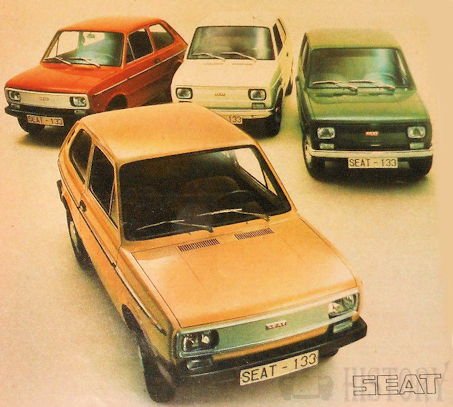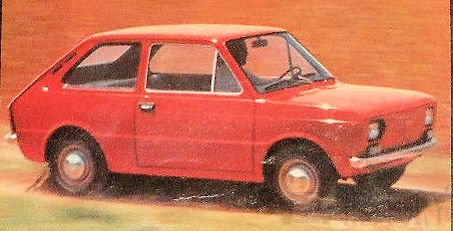Fiat/Seat 133
 |
|
| Overview | |
|---|---|
| Manufacturer | Seat |
| Production | 1974 to 1981 |
| Class | Motor car |
| Engines | 843cc 0.85 liters (25-32 kW) |
| Layout | 2 door |
| Fuel | Petrol |
| Transmission | Four-speed manual |
| Length | 3451 mm |
| Width | 1421 mm |
| Height | 1355 mm |
| Wheelbase | 2027 mm |
| Curb weight | 690 kg |
History
Presented at the Barcelona Motor Show in May 1974 , it represents a shelved FIAT Project, re-proposed for SEAT as the replacement of the older SEAT 600 and SEAT 850 , and also destined for the less demanding markets development route South America and Turkey , where it was sold under the FIAT brand , while in the rest of Europe as the SEAT brand .
Essentially, the 133 was an 850 with a redesigned body: in fact, the FIAT subcompact retained the entire mechanics(chassis and rear longitudinal engine cantilever of 843 cc of 34hp ), including the 202 cm wheelbase . The body, of new design, was however a sort of hybrid between that of the Fiat 126 , to which it was inspired front and rear, and that of the Fiat 127 to which the central part of the car resembled. The end result was a car of 345 cm in length, 142 in width and 132 in height and about 690 kg of weight.. It is no coincidence that the first units were fitted with the same 12 'wheels and relative hubcap stud fitted to the Fiat 850; subsequently those of the Fiat 127 will be used .
PERFORMANCE
- max power (DIN): 34 hp (25 kW) at 4,800 rpm
- max torque (DIN): 40 1b ft, 5.5 kg m (54 Nm) at 3,200 rpm
- max engine rpm: 5,500; 40.3 hp/l (29.7 kW/l)
- speed in top at 1,000 rpm: 13.7 mph, 22.1 km/h
- consumption: 40.9 m/imp gal, 34.1 m/US gal
The rear-mounted in- line four cylinder engine with 843 cc displacement was combined with a four-speed gearbox and offered in three performance variants, as "normal" (DG) with a power of 34 hp (25 kW) or as "super" (DB) with 37 hp (27 kW) and increased compression. These models had front and rear drum brakes .
The interiors were specific and of a modest aesthetic and quality level, and largely the same of the now dated 850 , with instrumentation reduced to the speedometer and the fuel level indicator; even the interior space was not exceptional.
Produced in the Spanish plants until 1979 , it was distributed under the SEAT brand since October 1975 with the FIAT brand (with the wording "Made by Seat" ) in the South American markets, in Germany , in France , in Belgium and the Netherlands . From June 1975 it was also sold in Great Britain , through the FIAT dealerships, given that SEAT was not provided with a local sales network at the time.
For the Spanish market, another version was offered with double carburetor and front disc brake . This Especial called model had 43 hp (32 kW) at 6400 / min, so it reached a top speed of 135 km / h. Also for the Spanish market, there were two trim levels, the Normal + Especial with normal body and the Lujo , or Especial Lujo with enlarged bumpers front and rear, and plastic panels on the front and rear panel.
From April 1977 it was also assembled in Egypt for both the domestic market and for export to Iraq . In the same year and until 1982 it was also built by FIAT in Argentina with a total of 15.821 built, at the Córdoba plant in two versions, "Standard"and "Deluxe" . The latter presented a front in plastic gray in color, with no function if not aesthetic - which however changed its appearance compared to the SEAT version - black plastic bands and side protection moldings. As an option wheels with perforated rims instead of those on the Fiat 850 . It was also distributed in other Latin American countries . Equipped with two engines of 903 cc displacement , derived Fiat 127 , with of 37 hp in the more powerful version and 34 in a weakened type to be able to use gasoline with 85 octane .
Its commercial success was indeed very modest and it does not result in any official importation into Italy except for some specimens registered by SEAT dealers. In particular it was not on the list but it was available through parallel import for FIAT employees, who could enjoy heavy discounts.
The Last production, which amounts to 190,984 units , ends in Argentina in 1982 .The replacement can be considered as the Fiat Panda , launched in 1980.

Technical
-
Seat 133 Technical details and specifications (1974-1981)
ENGINE
Location rear, longitudinal, 4 stroke
4 cylinders, vertical, in line
51.4 cu in, 843 cc (2.56 x 2.50 in, 65 x 63.5 mm)
compression ratio: 8: 1
cast iron block,
light alloy head
3 crankshaft bearings
valves: overhead, in line, push-rods and rockers
camshafts: 1, side
lubrication: gear pump, full flow filter6 imp pt, 7.2 US pt
1 Bressel 30 ICF-3 or Solex 30 PIB-5 downdraught single barrel carburettor
fuel feed: mechanical pump
sealed circuit cooling, liquid,13.2 imp pt, 15.9 US pt, 7.5 1.TRANSMISSION
driving wheels: rear
clutch: single dry plate
gearbox: mechanical; gears: 4 fully synchronized
ratios: I 3.636, II 2.055, III 1.409, IV 0.963, rev 3.615
final drive: hypoid bevel; axle ratio: 4.625CHASSIS
type integral
front suspension: independent, wishbones, transverse leafspring lower arms, transverse torsion bar, telescopic dampers
rear: independent, semi-trailing arms, coil springs. torsion bar. telescopic dampers.BRAKES
drum, dual circuit
lining area: front 33.5 sq in, 216 sq cm, rear 33.5 sq in, 216 sq cm. total 67 sq in. 432 sq cm.STEERING
rack-and-pinion
turns lock to lock: 2.80.
turning circle: 31.5 ft, 9.6 mELECTRICAL EQUIPMENT
12 V
34 Ah battery
230 W dynamo
Femsa DI 4-7 distributorDIMENSIONS AND WEIGHT
wheel base: 79.92 in, 203 cm
tracks: 45.28 in, 115 cm front. 48.03 in, 122 cm rear
length: 135.83 in, 345 cm
width: 55.91 in, 142 cm
height: 52.36 in, 133 cm
ground clearance: 5.30 in, 13 cm
weight: 1,521 1b, 690 kg
weight distribution: 39% front, 61% rear© Motor car History
Service
-
Seat 133 Technical details and specifications maintenance and Service Guide (1974-1981)
Fuel: 85 oct petrol
Oil: engine 5.8 imp pt. 7 US pt. 3.3 1, SAE 40W (winter) 30 (summer), change every 6,200 miles, 10,000 km
Gearbox and final drive 3.7 imp pt, 4.4 US pt, 2.1 1, SAE 90 EP, change every 18,600 miles, 30.000 km
Greasing: every 1,600 miles, 2,500 km, 2 points
Spark plug: 1750
Tappet clearances: inlet 0.006 in, 0.15 mm, exhaust 0.006 in, 0.15 mm
Valve timing: 16° 56° 56° 16°
Tyre pressure: front 20 psi, 1.4 atm, rear 28 psi, 2 atm.
Width of rims: 4"
Tyres: 5.50 x 12.
Carrying capacity: 706 1b, 320 kg
Fuel tank: 6.6 imp gal, 7.9 US gal, 30 1.© Motor car History
